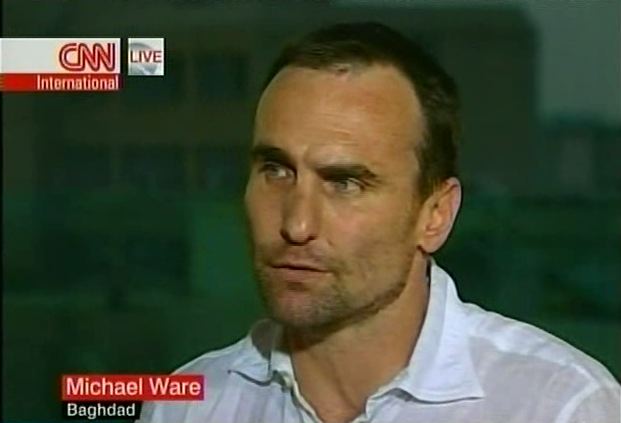YWT: "The enemies of America...know that America's on borrowed time."

Click photo to play
Length: 5:05
HALA GORANI: Let's bring in our senior Baghdad correspondent, Michael Ware, for a reality check on what's happening now in the country.
We have several operations. We have one in Diyala. We have also Sunni sheikhs allying themselves with America to combat al Qaeda. All this going on at the same time.
This is a very crucial time period for Iraq and for the Americans, isn't it?
MICHAEL WARE, CNN SR. BAGHDAD CORRESPONDENT: Very much so. And certainly the enemies of America -- as Washington identifies them, principally al Qaeda and the Iranian-backed Shia militias -- know that America's on borrowed time.
They know that the clock is ticking down to when the commander of the war, General David Petraeus, goes before Congress in September. So, as one of the other American generals in this country said, the enemies are surging as much as we are. They're trying to distort Petraeus' casualty figures and figures of violence before he goes to Congress so he has nothing but a gloomy picture to give.
GORANI: So those who oppose America keenly aware of the political agenda inside the United States and playing on it, right?
WARE: Oh, absolutely. Yeah.
They track it so minutely. They follow it in crucial detail, both to the east, in Tehran, of course, and al Qaeda. Al Qaeda has displayed over and over and over again its ability to play or factor American domestic politics. And we're seeing it again.
GORANI: Let me ask you something about the Anbar strategy of getting Sunni sheikhs, tribal leaders, in on a cooperative sort of team against al Qaeda. We saw so many of them killed in the downtown Baghdad hotel.
What happens when the Americans leave?
WARE: These will essentially become the Sunni militia. In fact, they are America's Sunni militia, or they're America's assassins. These are insurgents. These are the Ba'athists. These are the nationalists, the ex-Iraqi West Pointers, so to speak.
From the very beginning, they've never shared al Qaeda's agenda. From 2003, they were looking to work with America. But the administration back then wouldn't have a part of it. Now America knows that the only way to combat al Qaeda is to unleash the Ba'ath insurgency, and that's what they've done, even giving them ammunition.
GORANI: All right. Michael, stand by.
We're going to go to a Frederik Pleitgen story. He was in Diyala Province for an update on the so-called military surge and how American troops are having a hard time holding on to territory that they "conquered".
Take a look.
(BEGIN VIDEOTAPE)
FREDERIK PLEITGEN, CNN CORRESPONDENT (voice over): U.S. troops fire mortar rounds at a suspected insurgent position. Their mission: clear and secure this area south of Baghdad so Iraqi forces can take control of a checkpoint.
After almost three days of fighting, they hand over the outpost. Now it's up to the Iraqi national police to hold the position. "This is a big sector, and we need a lot of troops. And coalition forces will hopefully help us stand here," the Iraqi colonel says.
The insurgents came sooner than expected. A mosque right next to the checkpoint. And this is that same mosque only about two hours after U.S. troops left the area.
As this video shot from an aerial drone shows, the insurgents at the mosque launch an attack on the outpost, destroying a guard tower and killing several Iraqi officers. With the Iraqis struggling, a British aircraft is called in to aid them. The fighter drops a massive 2,000-pound bomb on a house used by the attackers, a rare opportunity for coalition forces to effectively use air power against insurgents.
COL. WAYNE GRIGSBY, U.S. ARMY: When the enemy does mass this way, we focus right then on the secure line of operation and we take everything that we have to kill or capture the enemy.
PLEITGEN: But while military officials call the airstrike a success, they acknowledge it highlights a major problem for U.S. forces in Iraq. American troops fight and die to win terrain from insurgents, but the Iraqi security forces are often unable to hold the ground on their own.
MAJ. GEN. RICK LYNCH, U.S. ARMY: The key is, someone has to stay. There has to be a persistent security presence, and that has to be Iraqi security forces. So we continue to work with the government of Iraq and the leaders of the Iraqi security forces to get that persistent presence.
PLEITGEN: A crucial point, military leaders say. Even with the major increase of U.S. soldiers in Iraq, they will not be able to hold all the ground they are now fighting for. That is something the Iraqis must do on their own.
Frederik Pleitgen, CNN, Salman Pak, Iraq.
(END VIDEOTAPE)
GORANI: All right. One last question to you, Michael Ware. We saw that in Salman Pak, but Diyala Province is going through a very crucial operation as well. And the big question is, will the insurgents move elsewhere? Have they gone already?
WARE: Well, indeed, the second most senior American general in the country, Lieutenant General Ray Odierno, has already said that as far as the U.S. forces are aware, the top al Qaeda leadership left Diyala before the operation. I mean, it was flagged so heavily.
I mean, the insurgents know that the U.S. is coming. They left Falluja. They left Samarra. They left Tal Afar. They've done the exact same thing yet again, and they'll continue to do so.
GORANI: All right. Michael Ware, thanks very much. All right, well, that's it from me and Michael Ware here in Baghdad for now.
Michael in Atlanta, back to you.
